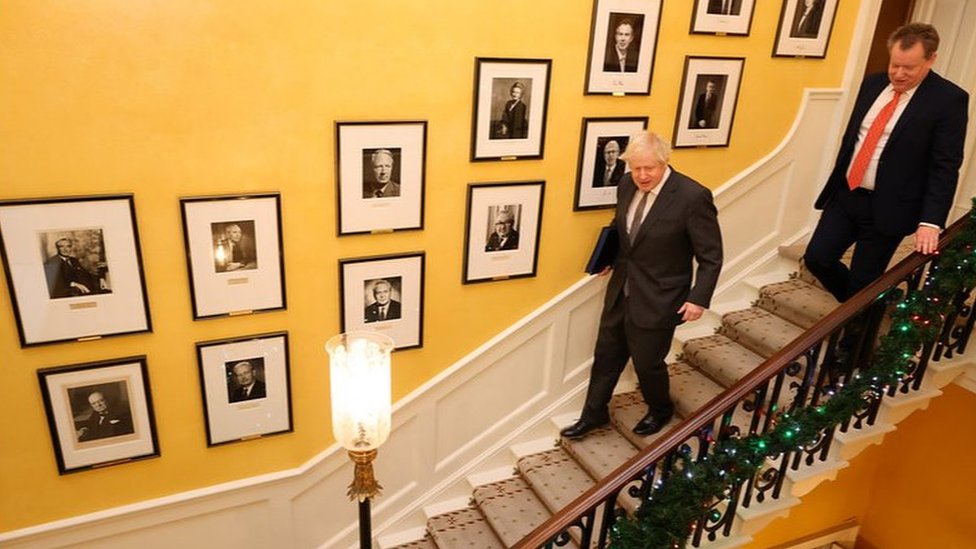
Compared to the pyrotechnics of the last few years, when the votes that would turn the EU treaty into law came to pass, it was rather a whimper not a bang.
Outwardly, at least, a calm conclusion to a period of huge uncertainty, political agony, and great anxiety in many ways: the fear of Brexiteers that their victory of 2016 would never be turned into the kind of reality they wanted to see; and worry from those who were on the other side of the argument about what might be lost.
And maybe, most commonly, frustration, and boredom too, for swathes of voters stuck in the middle - frustrated that our political system didn't seem able to cope with the task, and who by the time of the election last year, even before the trade negotiations were under way, would have been happy never to hear the 'B' word again, however they voted in 2016.
A long-term trade deal was agreed. And it sailed over the parliamentary hurdles.
What a difference a majority makes: explaining the screaming irony of Parliament's daily neuroses over every tiny point of the Brexit process between 2017 and 2019, compared to the relatively anodyne debate today. Reluctance from Brexit's one time opponents to protest too much - and real rage left to a sprinkling of Labour rebels and the smaller political parties.
For Boris Johnson, who we saw strolling down the famous yellow staircase in Downing Street today, past the portraits hanging on the wall of Conservative prime ministers whose careers were ended by splits over Europe, there is the prospect that he is the Tory leader who took us out of the EU, and also managed to bring years of vicious infighting to an end.
It was his former friend and rival, David Cameron, who wanted their party to stop 'banging on' about it.
But it may be Mr Johnson, who campaigned for the more disruptive solution of leaving the union, who is the one who brought closure to the fight.
The relative political calm, however, does not mask two big factors.
First, many aspects of how the country does business and interacts with the rest of the world are about to change in a dramatic way.
If you are Boris Johnson this is huge, and exciting.
If you are a business that's affected it might mean a big new opportunity, but it might also mean really big disruption and lots of extra hassle.
The fact that there is a trade deal doesn't take all of the risk away.
The treaty contains lots of uncertainty, not least for the biggest part of the economy: the service sector. Getting the agreement finalised in the time was a big achievement for both sides but there is a lot that it just doesn't cover that will, in time, have to be worked out somehow.
Second, the prime minister is right now simply refusing to accept that in a couple of days, even under this deal, that for a lot of businesses and individuals it's going to be more complicated, not less, to interact with our nearest neighbours.
In our interview today, he just refused to admit that there would be new barriers - whether that's work permits for some European countries, different paperwork for taking your pet on holiday, more customs paperwork, some qualifications not being recognised on the other side of the Channel...the list goes on and on.
In the end, Boris Johnson accepted that there would be "changes".
But he seems allergic to admitting that his political choices could make it harder in many ways, even suggesting that actually businesses might find it more straightforward because, as with the rest of the world, there will be customs admin to deal with for EU countries too.
It is perfectly legitimate to argue, as many Brexiteers have, that the extra costs and hassle will be well worth the potential of what the UK stands to gain.
Surely though, there is a political risk to pretending there is almost no downside at all?
(Reminder, you can get a flavour of just some of the things that are changing here.)
But tonight Brexit is 'done' because we left the EU last January on the back of Boris Johnson's thumping victory in the general election.
And the deal that shapes how the UK's relationship with the rest of the continent works is 'done' too - signed, sealed, voted on, and almost delivered - it will get Royal Assent tonight, or perhaps early tomorrow (depending on how late the Queen stays up to sign it).
The last official day, at least, of specific Brexit debate did not have the hysterics that were the soundtrack to so much of the last few years.
Bizarrely muted perhaps, but an ending to a journey that mattered so much.
https://news.google.com/__i/rss/rd/articles/CBMiLWh0dHBzOi8vd3d3LmJiYy5jb20vbmV3cy91ay1wb2xpdGljcy01NTQ5Mzg2NNIBMWh0dHBzOi8vd3d3LmJiYy5jb20vbmV3cy9hbXAvdWstcG9saXRpY3MtNTU0OTM4NjQ?oc=5
2020-12-30 21:02:00Z
52781275482250
Tidak ada komentar:
Posting Komentar